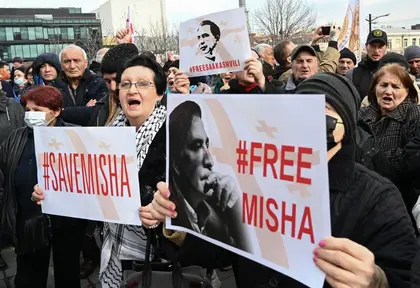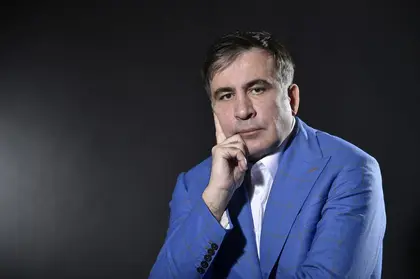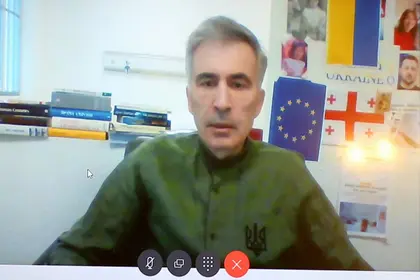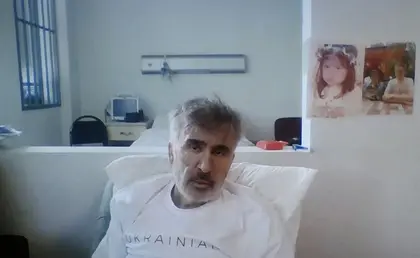Many voices have written advocating for Mikheil Saakashvili’s liberation since his detention in 2021. A brief summary of the third President of Georgia “Misha” Saakashvili’s life and career would therefore be redundant.
JOIN US ON TELEGRAM
Follow our coverage of the war on the @Kyivpost_official.
Suffice it to say that under Saakashvili the Georgian economy grew by 70 percent, and the country had set out on a bid to join Europe and NATO.
Under his rule, Georgia lived through the darkest hour of its post-independence history, when it was attacked and invaded by Russia, which resulted in the occupation of two of its regions, Abkhazia and Tskhinvali – or 20 percent of its territory. But it did not result in what Russia desired most: the full political capitulation of Georgia to its de facto rule.
Saakashvili has been a man of great achievements, all of them obtained by clear stances and decisive actions, for which he has paid dearly. Political costs when his presidency ended and he left Georgia; personal costs during his odyssey through Poland and Ukraine; and the highest cost now – paying with his life.
If we analyze the problem through the lens of Saakashvili’s individual resume, it may be difficult to understand why he has chosen to go through all of this. But if we shift the focus from the tragedy of a man to the tragedy of a country and a vast area of the world, we understand why Saakashvili is ready to die.

Georgians Сall For Ex-Leader's Release on Revolution Anniversary
Unfortunately he is doing this with hardly anyone trying to impede it.
The Ukrainian government, for its part, has issued official calls for his liberation.
Many influential figures have lent their voices on his behalf. His party, the United National Movement (UNM), has been campaigning for his liberation from the beginning, and the UNM’s newly appointed head, Levan Khabeishvili, even declared his willingness to “physically break him out.”
Supporters show their solidarity, on the streets and on social media, with Monday’s latest international rallies to liberate Saakashvili being held in various capitals of the world.
Why is Saakashvili’s liberation so heartfelt and important? There are reasons that go beyond the need to stand up against the human rights abuses to which Saakashvili is being subjected.
It is about the fate of an entire country, Georgia, and the fate of the entire area that was once part of the Soviet Union.
When talking about recent Georgian history, it is about the “Saakashvili era” that historians and political scientists refer to. The chronological boundaries of it do not coincide with Misha’s presidency.
It is a “Renaissance” of sorts, a “Belle époque” – a period that in time will be viewed to have started and ended with a major historical event reversing the trend of that time.
If the Saakashvili era began with the “Rose Revolution” of 2003 – putting an end to Georgia as a post-Soviet failed state – then today might be the end of it. Why now – a good ten years after Saakashvili ended his political course in Georgia?
Because now, for the first time since Georgians turned onto their new political course when they marched through the streets of Tbilisi back in 2003, Georgians have stopped taking to the streets.
Georgians had regularly gathered en masse over the years to confront decisions and policies they deemed would cause their country to drift away from their chosen path.
Now, as Saakashvili languishes in a prison hospital, Georgians are astonished. Their country is full of fleeing Russians – the very people whose government still occupies 20 percent of Georgia’s territory. Despite security concerns, the government has yet to establish a visa regime for these northern “refugees.”
Instead, after Russia imposed a flight ban to Georgia in 2018, in order to hurt its tourism sector (it didn’t), the Georgian government is now, during wartime, considering whether to restore flights between Tbilisi and Moscow.
Many Georgians are leaving the country; those who stay seem increasingly resigned.
“But some of us are staying and struggling,” Georgian lawmaker Nona Mamulashvili told Kyiv Post. Mamulashvili – whose brother Mamuka is the founder and commander of the Georgian Legion of Ukraine, fighting in Donbas since 2014 – is a prominent member of the UNM, the party Saakashvili founded.
Last January, the UNM held elections to appoint its new chair.
“All the voices in the party agreed from the start that the political objective number one is to free Misha,” Mamulashvili explained, as he’s considered “a political prisoner, held in Georgia, by order of Russia.”
In 2018, Saakashvili was sentenced in absentia for alleged abuse of power during his mandate as President, and arrested upon his comeback to Georgia in 2021. In 2014, when first warranted arrest, he argued to be victim of a witch-hunt orchestrated by Moscow, who would have never pardoned him challenging Russia 2008 war against Georgia.
And now, Saakashvili has repeatedly stated that his prosecution and detention is the result of Putin’s will to kill him, rather than a Georgian initiative. Recently, Saakashvili speculated that those who organized Saakashvili’s return to the country, which resulted in his detention, may have been Russian agents.
“What Russia wants is Saakashvili to be killed in Georgia, by Georgians,” Mamulashvili said.
Indeed, Russia wants to kill Saakashvili because he represents an era, an aspiration. Although Saakashvili’s detractors may have their reasons to oppose him, they appear muted now with him in detention.
Because Saakashvili represents the hope that had animated Georgia before the country started to gradually be dragged back into a suffocating dependence.
And this hope is something Ukraine knows too well. It is a common aspiration in former Soviet countries – the pursuit of decolonization and detachment from the central power that had clipped its wings and desires to keep doing so.
“If Georgia doesn’t change this path, it is doomed to become a second Belarus,” Mamulashvili says. “Russia is attempting everything possible to isolate Georgia, and force it into total dependence on Moscow.”
Ukraine also knows that nothing enrages Russia and moves it to war as much as the legitimate popular aspiration to an independent political path. This is what happened with the Euromaidan in 2014, and what happened in Georgia in 2008.
In this sense, Saakashvili is a symbol. That is why he is being slowly poisoned and starved, just as in Soviet times with the Cheka, Stalin’s NKVD, the KGB – and now Russia’s FSB.
With Saakashvili suffering and risking death, the roses of the revolution are withering.
But not everything is lost. While Ukrainians are sacrificing their lives for this struggle, protecting the dignity of the free world, and with Georgians praying and fighting themselves for their sister country, it is not too late for the civilized world to intervene and free Misha.
Scripture says that “whoever saves a life saves the whole world.” Since Saakashvili incarnates a historical paradigm common to so many people of the world, this might truly be the case.
The views expressed in this opinion article are the author’s and not necessarily those of Kyiv Post.
You can also highlight the text and press Ctrl + Enter






